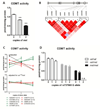Epistasis between polymorphisms in COMT, ESR1, and GCH1 influences COMT enzyme activity and pain
- PMID: 25218601
- PMCID: PMC4253645
- DOI: 10.1016/j.pain.2014.09.009
Epistasis between polymorphisms in COMT, ESR1, and GCH1 influences COMT enzyme activity and pain
Abstract
Abnormalities in the enzymatic activity of catechol-O-methyltransferase (COMT) contribute to chronic pain conditions, such as temporomandibular disorders (TMD). Thus, we sought to determine the effects of polymorphisms in COMT and functionally related pain genes in the COMT pathway (estrogen receptor 1 [ESR1], guanosine-5-triphosphate cyclohydrolase 1 [GCH1], methylenetetrahydrofolate reductase [MTHFR]) on COMT enzymatic activity, musculoskeletal pain, and pain-related intermediate phenotypes among TMD cases and healthy control subjects. Results show that the COMT rs4680 (val(158)met) polymorphism is most strongly associated with outcome measures, such that individuals with the minor A allele (met) exhibit reduced COMT activity, increased TMD risk, and increased musculoskeletal pain. Epistatic interactions were observed between the COMT rs4680 polymorphism and polymorphisms in GCH1 and ESR1. Among individuals with the COMT met allele, those with 2 copies of the GCH1 rs10483639 minor G allele exhibit normalized COMT activity and increased mechanical pain thresholds. Among individuals with the COMT val allele, those with 2 copies of the ESR1 rs3020377 minor A allele exhibit reduced COMT activity, increased bodily pain, and poorer self-reported health. These data reveal that the GCH1 minor G allele confers a protective advantage among met carriers, whereas the ESR1 minor A allele is disadvantageous among val carriers. Furthermore, these data suggest that the ability to predict the downstream effects of genetic variation on COMT activity is critically important to understanding the molecular basis of chronic pain conditions.
Keywords: Catecholamines; Fibromyalgia; Gene expression; Gene–gene interaction; Temporomandibular disorders.
Copyright © 2014 International Association for the Study of Pain. Published by Elsevier B.V. All rights reserved.
Figures





Similar articles
-
Association analysis of the catechol-O-methyltransferase /methylenetetrahydrofolate reductase genes and cognition in late-onset depression.Psychiatry Clin Neurosci. 2014 May;68(5):344-52. doi: 10.1111/pcn.12133. Epub 2013 Dec 25. Psychiatry Clin Neurosci. 2014. PMID: 24373005
-
The MAOA, COMT, MTHFR and ESR1 gene polymorphisms are associated with the risk of depression in menopausal women.Maturitas. 2016 Feb;84:42-54. doi: 10.1016/j.maturitas.2015.10.011. Epub 2015 Oct 30. Maturitas. 2016. PMID: 26620113
-
Polymorphisms of Nav1.6 sodium channel, Brain-derived Neurotrophic Factor, Catechol-O-methyltransferase and Guanosine Triphosphate Cyclohydrolase 1 genes in trigeminal neuralgia.Clin Neurol Neurosurg. 2021 Sep;208:106880. doi: 10.1016/j.clineuro.2021.106880. Epub 2021 Aug 8. Clin Neurol Neurosurg. 2021. PMID: 34418703
-
Are catechol-O-methyltransferase gene polymorphisms genetic markers for pain sensitivity after all? - A review and meta-analysis.Neurosci Biobehav Rev. 2023 May;148:105112. doi: 10.1016/j.neubiorev.2023.105112. Epub 2023 Feb 24. Neurosci Biobehav Rev. 2023. PMID: 36842714 Review.
-
Association between the catechol-O-methyltransferase (COMT) Val158Met polymorphism and motor behavior in healthy adults: A study review.Brain Res Bull. 2019 Jan;144:223-232. doi: 10.1016/j.brainresbull.2018.11.002. Epub 2018 Nov 13. Brain Res Bull. 2019. PMID: 30445182 Review.
Cited by
-
Association of Catechol-O-Methyl-Transferase and Estrogen Receptors polymorphism with Severity of Temporomandibular Disorder in Iranian Patients.Avicenna J Med Biotechnol. 2023 Oct-Dec;15(4):245-252. doi: 10.18502/ajmb.v15i4.13498. Avicenna J Med Biotechnol. 2023. PMID: 38078344 Free PMC article.
-
An Italian Twin Study of Non-Cancer Chronic Pain as a Wide Phenotype and Its Intensity.Medicina (Kaunas). 2022 Oct 26;58(11):1522. doi: 10.3390/medicina58111522. Medicina (Kaunas). 2022. PMID: 36363479 Free PMC article.
-
A genetic variant in the catechol-O-methyl transferase (COMT) gene is related to age-dependent differences in the therapeutic effect of calcium-channel blockers.Medicine (Baltimore). 2017 Jul;96(30):e7029. doi: 10.1097/MD.0000000000007029. Medicine (Baltimore). 2017. PMID: 28746172 Free PMC article.
-
Neuroinflammation and Central Sensitization in Chronic and Widespread Pain.Anesthesiology. 2018 Aug;129(2):343-366. doi: 10.1097/ALN.0000000000002130. Anesthesiology. 2018. PMID: 29462012 Free PMC article. Review.
-
Nuclear factor-kappa B regulates pain and COMT expression in a rodent model of inflammation.Brain Behav Immun. 2015 Nov;50:196-202. doi: 10.1016/j.bbi.2015.07.014. Epub 2015 Jul 15. Brain Behav Immun. 2015. PMID: 26187567 Free PMC article.
References
-
- Ahlers SJ, Elens LL, van Gulik L, van Schaik RH, van Dongen EP, Bruins P, Tibboel D, Knibbe CA. The Val158Met polymorphism of the COMT gene is associated with increased pain sensitivity in morphine-treated patients undergoing a painful procedure after cardiac surgery. Br J Clin Pharmacol. 2013;75(6):1506–1515. - PMC - PubMed
-
- Antoniades C, Shirodaria C, Van Assche T, Cunnington C, Tegeder I, Lotsch J, Guzik TJ, Leeson P, Diesch J, Tousoulis D, Stefanadis C, Costigan M, Woolf CJ, Alp NJ, Channon KM. GCH1 haplotype determines vascular and plasma biopterin availability in coronary artery disease effects on vascular superoxide production and endothelial function. J Am Coll Cardiol. 2008;52(2):158–165. - PMC - PubMed
-
- Barbosa FR, Matsuda JB, Mazucato M, de Castro Franca S, Zingaretti SM, da Silva LM, Martinez-Rossi NM, Junior MF, Marins M, Fachin AL. Influence of catechol-O-methyltransferase (COMT) gene polymorphisms in pain sensibility of Brazilian fibromialgia patients. Rheumatol Int. 2012;32(2):427–430. - PubMed
-
- Barnett JH, Heron J, Ring SM, Golding J, Goldman D, Xu K, Jones PB. Gender-specific effects of the catechol-O-methyltransferase Val108/158Met polymorphism on cognitive function in children. Am J Psychiatry. 2007;164(1):142–149. - PubMed
-
- Belfer I, Schreiber KL, Shaffer JR, Shnol H, Blaney K, Morando A, Englert D, Greco C, Brufsky A, Ahrendt G, Kehlet H, Edwards RR, Bovbjerg DH. Persistent postmastectomy pain in breast cancer survivors: analysis of clinical, demographic, and psychosocial factors. J Pain. 2013;14(10):1185–1195. - PubMed
Publication types
MeSH terms
Substances
Grants and funding
LinkOut - more resources
Full Text Sources
Other Literature Sources
Medical
Miscellaneous

